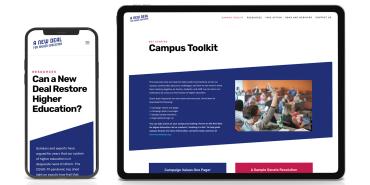New Deal for Higher Education
Higher education in the United States is in crisis. Decades of draconian cuts to public funding for colleges and universities have shifted the burden of paying for higher education from the broader public to the individual student. Abandoning higher education as a common good has led to crippling student debt, the replacement of a full-time faculty with protections for academic freedom and a voice in shared governance by an exploited contingent teaching corps, and a diminished ability for academic experts to use their skills for the public good. Increasingly, colleges and universities are portrayed as merely tools for job training and personal advancement, or even mischaracterized as centers of liberal indoctrination. The crisis closes doors to students, exacerbates racial and class inequalities, demoralizes the ranks of faculty and staff, and hollows out the teaching and research upon which our nation relies.
We need a New Deal for Higher Education. The challenges of the 21st century—emerging diseases, racial inequality, climate change, food insecurity, and others—require we reinvest in our educational system and return to the mission of higher education.
The New Deal for Higher Education campaign, launched in February 2021 with our partners at the American Association of University Professors, embraces American higher education and the people who work in it as they support a diverse citizenry and promote the general welfare. The campaign uses collective action to influence college and university policies, advocate for state legislation, and push members of Congress to reauthorize the federal Higher Education Act and create other federal policies that establish stable, dedicated public funding streams and hold administrations accountable for how those monies are spent. This campaign advocates for
- prioritizing teaching, research, and supporting student success;
- allowing all students to access higher education regardless of their ability to pay;
- ensuring job security, equitable pay, professional voice, and sustainable careers for all faculty and staff;
- creating academic environments free from racism, sexism, and other bigotries that prevent learning, degrade research, and perpetuate inequality; and
- canceling student debt for borrowers who have unjustly shouldered the burden of financing higher education the last 40 years.
We’re already making progress. Public higher education institutions received a historic infusion of federal funding to assist in COVID-19 recovery efforts thanks to the passage of the American Rescue Plan Act. And the infrastructure package the AFT has been advocating for offers more funding to stabilize pandemic-stricken colleges and universities, make college more accessible to more Americans, and create a safe workplace for higher education employees and students. Reforms to our student debt system, including desperately needed fixes to Public Service Loan Forgiveness and even broad-based debt cancellation, are within reach.
The New Deal for Higher Education is committed to seeing that these possibilities become realities and using that momentum to lay the foundation for a 21st-century higher education system that benefits and empowers all of us. But successfully returning to the mission of higher education requires establishing engaged, effective coalitions on our members’ campuses—and we need your help. Learn more about the campaign and how you can get your campus involved through our Campus Toolkit, available at newdealforhighered.org/campus-toolkit. If you’d like to talk more about organizing campus events, email us at highered@aft.org.
Professional Development Offered Through Summer Educator Academy
Every summer, the AFT’s eight-day Summer Educator Academy is offered to all K–12 locals looking to build their internal capacity to lead professional development for their members. The academy is a comprehensive and intensive training designed to equip educators with high-quality, research-based content they can use daily in their classrooms and share with peers in their locals.
Professional development offerings fulfill a central tenet of the AFT’s philosophy of professional unionism: the benefits of union membership include collective bargaining for better working conditions and job security and an emphasis on helping educators cultivate their professional expertise and enrich their students’ learning.
In nonpandemic times, the Summer Educator Academy is a face-to-face training. In these times, when we all had to pivot to online teaching, learning, communicating, and socializing, the AFT’s educational issues professional development team, along with AFT national trainers, designed online train-the-trainer versions of courses. Summer 2021 sessions covered a dozen topics, including strategies for English language learner success and for all students to succeed in our “new normal,” instructional and assessment strategies for all disciplines, organizing the classroom for effective teaching and learning, strategies for social and emotional learning, and a course exploring how educators’ personal and social identities inform their teaching.
Although courses were primarily held mid-July through mid-August, two trainings have additional sessions scheduled. “Beginning Reading Instruction,” which focuses on the best ways to teach reading from pre-K through the primary grades, will have a six-hour presentation on September 18. And training in the “Thinking Mathematics 3–5” course, which focuses on how children learn math concepts, will have a two-day follow up in January 2022. For more information about the Summer Educator Academy and the many other professional learning opportunities offered by the AFT, contact Lisa Dickinson at edickinson@aft.org or visit aftelearning.org/professional-learning.
AFT Teacher Leaders Program Growing, Reaches Tenth Year
In 2011, noting that teachers were too often excluded from educational policy discussions affecting their classrooms, the AFT began the Teacher Leaders Program to prepare educators to take active leadership roles in their schools, unions, and communities. This yearlong program, which has grown from five locals in the pilot 2011–12 year to 26 in the 2020–21 year, is where the rubber meets the road. The Teacher Leaders Program taps into what we know exists within educators, empowering them to seize their leadership potential through skill in research, advocacy, and public speaking.
Research projects have included topics related to curriculum, politics, mental health, restorative practices, testing, evaluation, and health and safety. If it happens in schools, these educators research the policy around it and recommend strategies to enhance students’ learning conditions and mitigate any unintended consequences. In addition to developing more than 200 separate research projects, our Teacher Leaders have dedicated time to speaking with boards of education, state legislators, and business professionals; writing blogs; and attending professional development sessions—all while continuing to educate their students virtually and in person.
As of June 2021, close to 1,500 classroom teachers, school custodians, para-educators, school nurses and counselors, and other school staff members have completed the program. To learn more about the Teacher Leaders Program and how you can participate, contact Marjorie Brown at mbrown@aft.org.
Share My Lesson Site Gets a Facelift
Share My Lesson released a major site upgrade in time for the new school year, featuring content for AFT members and brand-new sections for paraprofessionals and school-related personnel, specialized instructional support personnel, higher education professors, parents and caregivers, AFT member-only content, and, of course, teachers.
The updates—based on user feedback—make it even easier to find the great content you need quickly, saving you time so that you can stay focused on your students. With nearly half a million free resources and content organized by grade, subject, and topic, Share My Lesson has something for everyone.
We’ve added more professional roles and subjects to our resource bank to fully support the education profession. Whether you need a resource on how to improve positive behaviors and communication along your bus route or a lesson to help fourth-graders master fractions, Share My Lesson has you covered. We’ve also added new health and wellness subjects to support the work of counselors, nurses, therapists, and other school-based healthcare providers.
And for our higher education faculty, Share My Lesson is a great platform for sharing your favorite lessons and finding a wide variety of resources to meet the needs of your students.
Finally, our AFT Members section highlights AFT affiliate pages and member benefits, including research-based professional development. Check out the site at sharemylesson.com.
Grief-Sensitive Educator Project Helps Educators Support Grieving Students
More than 18 months into the pandemic, it can still be challenging for educators to connect with and comfort students who have experienced loss, whether it’s the passing of a loved one, the loss of a home, or missing social relationships. The Grief-Sensitive Educator, a collection of grief support resources, was launched in late December 2020 to help. Since then, close to 750 educators have participated in its 90-minute grief and loss training sessions to learn strategies to support bereaved students, including tips on what to say, how to make assignment accommodations, and how to teach kindness so other students can support those who are grieving.
The sessions are grounded in survey data from AFT members showing that educators felt underprepared to address students’ pandemic-related emotional needs and in the AFT’s work with the Coalition to Support Grieving Students, a rich resource for better understanding the needs of grieving students in the classroom. In addition to the training sessions, members have access to the coalition’s self-paced learning sessions, via Share My Lesson, and other helpful tools. Members can connect to the project via the archived webinar “Supporting Students with Grief and Loss” here. To learn more about the work of the Coalition to Support Grieving Students, visit grievingstudents.org.
Project ELITE Provides National Training for ELL Tutors
The AFT invited a group of approximately 30 members representing 13 locals to be part of a special pilot literacy training—Project ELITE (Expanding Literacy Instruction by Tutoring ELLs)—for educators working one-on-one with English language learners in grades K–5 or who train other educators. The training is being developed by Diane August, one of the foremost experts in the field of second language acquisition and literacy and the author of two authoritative research volumes on ELLs from the National Academy of Sciences.
Through this 20-hour course, participants learned research-based practices to support the literacy development of ELLs with digital learning resources and individualized instruction. Feedback from the sessions was overwhelmingly positive, with a majority of attendees reporting the training was a high-quality overview of literacy skills and would help them better support their students. We will be following up with participants this fall and winter to check on their progress. To learn more, email edissues@aft.org.


